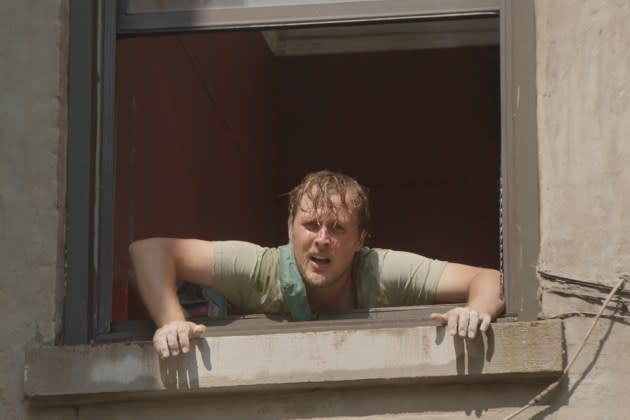‘Stress Positions’ Review: Where So Many Have Failed, This Team Delivers a Hilarious Pandemic Comedy

Building on the promise of her short film “My Trip to Spain,” which played Sundance in 2022, filmmaker Theda Hammel returns to the festival with her feature debut, “Stress Positions.” Joined by favorite collaborator and lead actor John Early, she brings along the same wry sharp humor and the same incisive parody of her generation, only this time, Hammel is playing on a bigger canvas, directing a larger cast and tackling more topics and themes. Among other things, the film might be the first genuinely enjoyable film made about the pandemic.
Set entirely within a few days in the summer of 2020, “Stress Positions” follows Terry Goon (Early) as he navigates a rather stressful few weeks. Recently divorced and unemployed, he’s living in his ex-husband’s Brooklyn brownstone, scared out of his mind about getting infected with COVID. At the same time, he’s caring for 19-year-old nephew Bahlul (Qaher Harhash), a half-Moroccan model with his own existential crisis.
More from Variety
Nearby, his friend Karla (Hammel) and her girlfriend Vanessa (Amy Zimmer) complicate his life with their meddling. His eccentric upstairs lodger Coco (Rebecca F. Wright) is a COVID denier who’s a bad influence on Bahlul, further vexing Terry. On the sidelines, an attractive delivery guy (Faheem Ali) complicates Terry and Karla’s already fraying friendship. Serving as an unconventional Chekov’s gun is a neck massager that keeps going from one character to the next, leading to shocking final results that throw most of the characters into a chaotic frenzy.
To add historical context to these fraught inter-relationships, Hammel uses voiceover in a unique way: Instead of one narrator, there are several, and they don’t tell just their view of the story but the emotional entanglements that drive them and shape how they are behaving in the present. This keeps the audience as disoriented as the characters, adding to the hallucinogenic nature of the storytelling.
Using blurred and slowed-down shots with the camera just off-center, Hammel manages to visually represent memories in a similarly haunting way. The many conversation scenes are mostly filmed in tight close-ups, instead of mid-shots, amplifying the actors’ intense delivery of the dialogue and hinting at the characters’ complicated feelings toward one another. Elsewhere, there’s a frenetic rhythm to the proceedings showing the anxiety and fear specific to that pandemic summer.
Throughout, Hammel proves a sharp humorist fixated on showcasing and satirizing annoying, ignorant people. These characters hate everyone starting with themselves. They are completely clueless while thinking they are the smartest; everyone who is not them is awful and the butt of jokes. Time and time again, they reveal how socially, politically and geographically illiterate they are. In real life, anyone would hate to spend even a few minutes in their company. Yet in Hammel’s hands, they become easy to enjoy and laugh at while completely understanding their full awful personalities.
Hammel and frequent collaborator Early firmly put their queer generation in the hot seat. They start with themselves and then make fun of everyone else. No topic is above making fun of: death, 9/11, transness, the vapidness of gay men. As a writer of quips and jokes, Hammel is unmatched, consistently hitting the bullseye with so many memorable lines, like calling gay mecca Fire Island “a beach retreat for the children of Sodom.”
Early gives an expert performance of physical comedy. Every face twitch and arm gesticulation conveys Terry’s complete exasperation with everything and everyone in his world. He finds laughter even in the most mundane of dialogue lines: “I slipped on a chicken.” When Terry talks of his hatred and contempt for someone — something he does a lot — Early telegraphs his disdain with such comic intensity, there’s no recourse but to love the performance while side-eyeing the character with utter repugnance.
The humor and the performance won’t be for everyone. There’s an abhorrent center to all of this, but it’s also cunningly smart. The audience is asked to laugh at these intolerable people, while the writing, filmmaking and performances reveal their utter hollowness.
Best of Variety
Sign up for Variety’s Newsletter. For the latest news, follow us on Facebook, Twitter, and Instagram.
